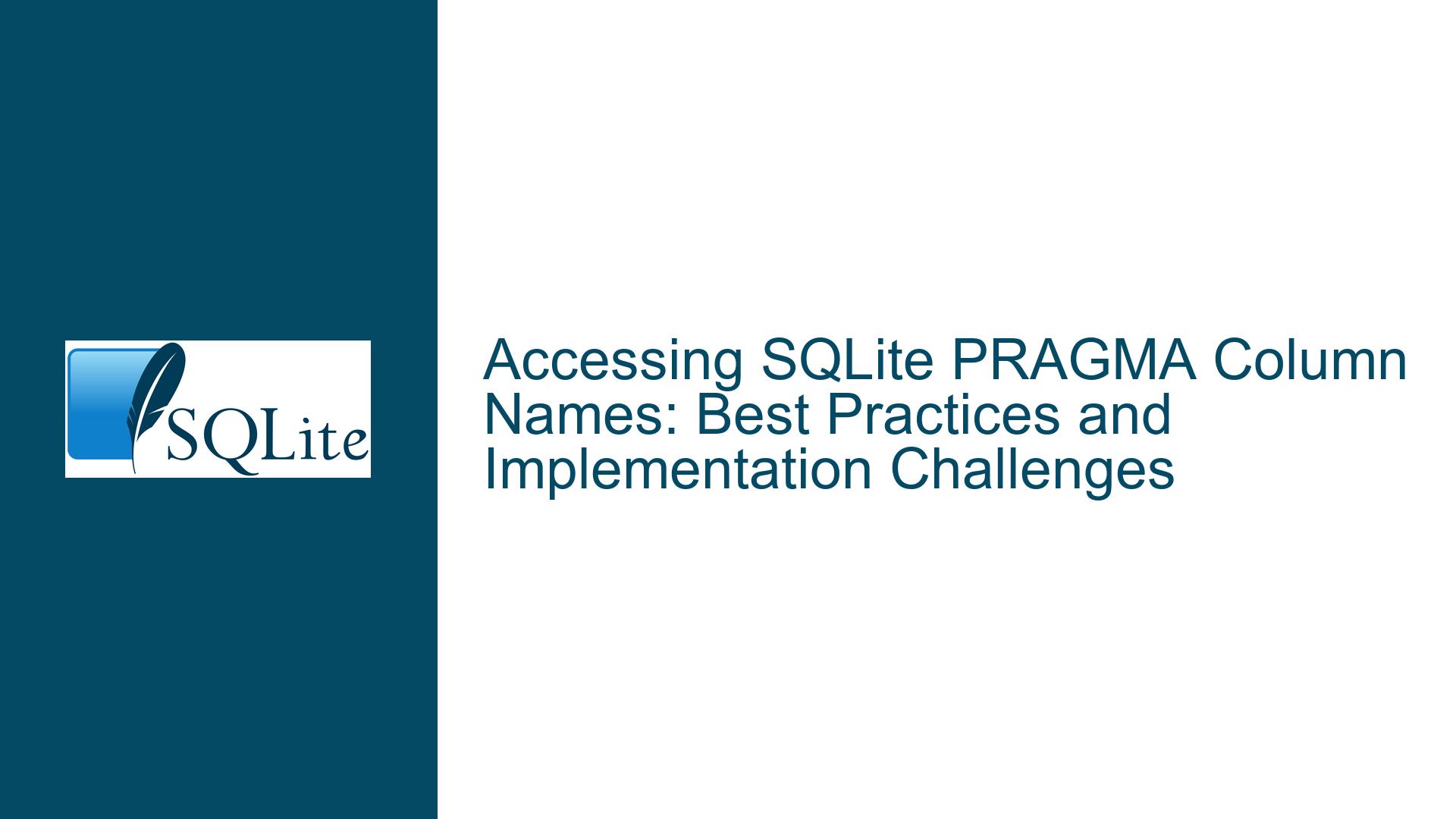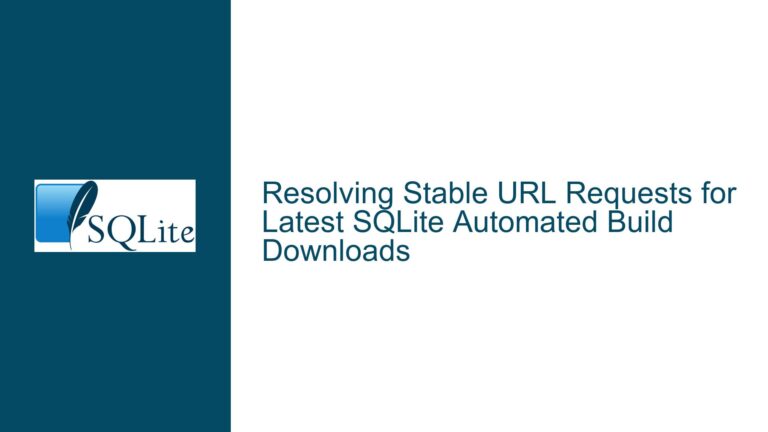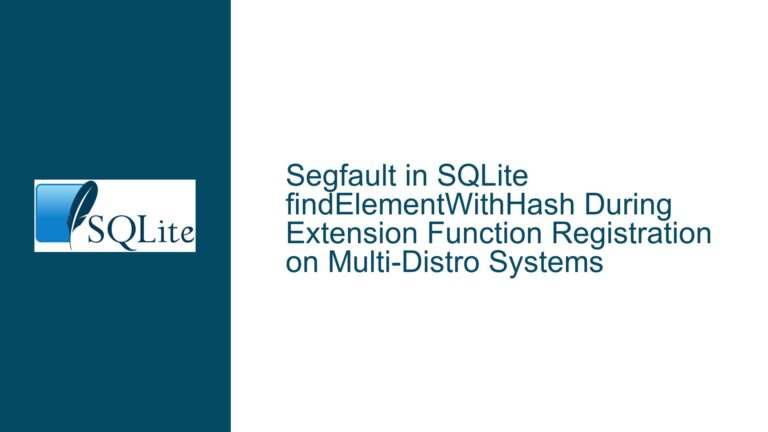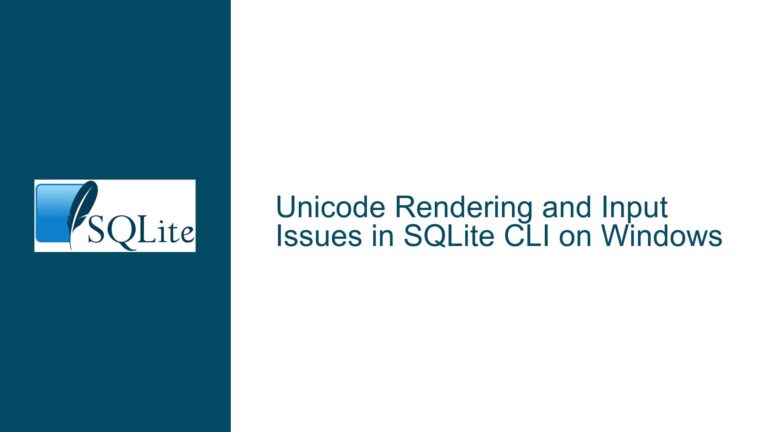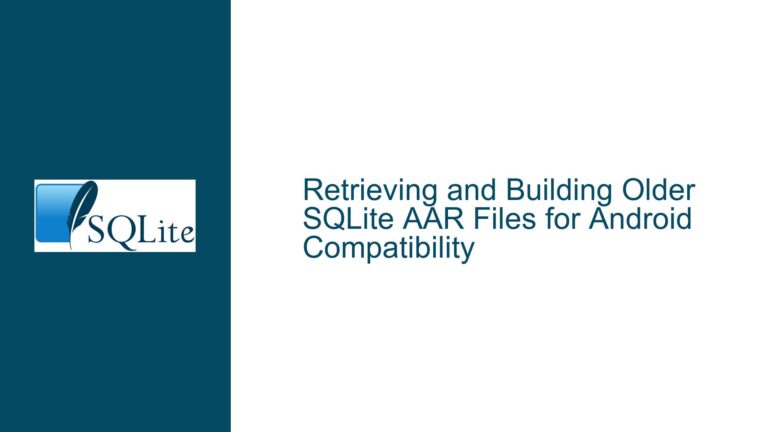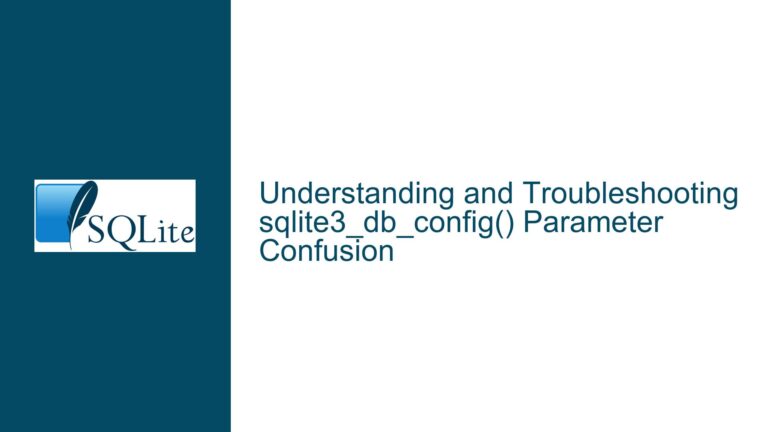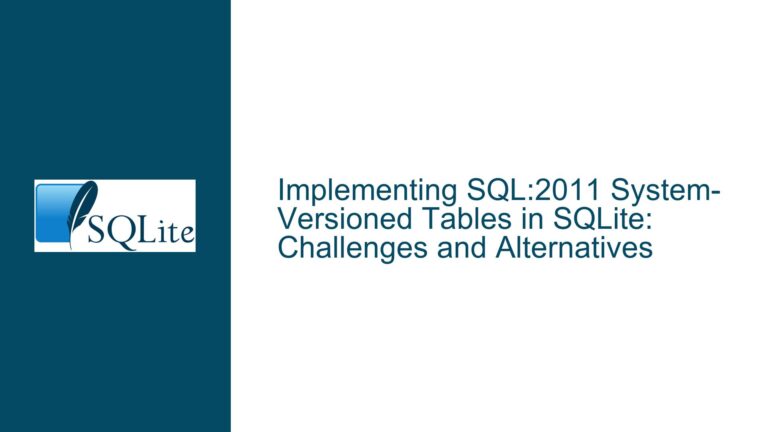Accessing SQLite PRAGMA Column Names: Best Practices and Implementation Challenges
Understanding PRAGMA Column Metadata Access in SQLite FDW Integration
The core issue revolves around accessing and standardizing column names in SQLite PRAGMA table outputs within a PostgreSQL Foreign Data Wrapper (FDW) implementation. A developer working on a PostgreSQL SQLite foreign data wrapper encountered inconsistencies in how column names are documented and accessed across different PRAGMA commands.
The challenge specifically manifests in the implementation of PRAGMA support as PostgreSQL table functions, where certain PRAGMA commands like table_info and table_list have well-documented column names in the SQLite source code, while others such as list_foreign_keys, list_index, and index_info lack official column name documentation. This inconsistency creates difficulties in maintaining reliable integration between PostgreSQL and SQLite systems.
SQLite’s PRAGMA commands serve as essential diagnostic and metadata retrieval tools, despite being considered unstable interfaces according to official documentation. The PostgreSQL FDW aims to provide SQLite database diagnostics support similar to the native SQLite shell, making PRAGMA command functionality crucial for maintaining compatibility across multiple PostgreSQL versions.
The technical implications extend beyond simple naming conventions. The FDW must handle these PRAGMA outputs across 5-6 PostgreSQL versions while managing changes in both SQLite and PostgreSQL codebases. SQLite’s lightweight and self-contained nature makes it particularly valuable for embedded applications, but this same characteristic creates unique challenges when integrating with more complex database systems like PostgreSQL.
Two potential solutions emerged from the discussion: directly accessing column names through SQLite’s C API using sqlite3_column_name() calls, or implementing custom code to handle PRAGMA outputs. The sqlite3_column_name() approach offers a more stable and maintainable solution compared to parsing source code comments or maintaining custom implementations.
The broader context involves balancing backward compatibility with functionality. While SQLite’s PRAGMA commands are officially documented as unstable interfaces that may change between versions, the practical reality shows that PRAGMA output changes occur relatively infrequently. This stability creates an opportunity for careful integration while remaining mindful of potential future changes.
This situation highlights a common challenge in database integration: maintaining compatibility between systems with different design philosophies. SQLite’s emphasis on simplicity and self-containment contrasts with PostgreSQL’s more complex, feature-rich architecture, requiring careful consideration of interface stability and maintenance requirements when building integration tools.
Root Causes in SQLite PRAGMA Column Name Inconsistencies
Several fundamental factors contribute to the challenges surrounding PRAGMA column name access and standardization in SQLite database operations. These causes stem from both architectural decisions and implementation patterns within the SQLite ecosystem.
Database Interface Design Philosophy
SQLite’s core architecture emphasizes simplicity and minimal dependencies, leading to PRAGMA commands being implemented as special non-SQL interfaces. This architectural choice results in PRAGMA commands existing outside the standard SQL parsing and execution pipeline, creating inherent inconsistencies in how column metadata is handled compared to regular SQL queries.
Implementation Variability
The internal implementation of PRAGMA commands shows significant variation across different SQLite versions and features. Some PRAGMA implementations utilize virtual tables with well-defined schemas, while others employ direct C-code output generation. This divergence in implementation approaches creates inconsistent metadata handling patterns, particularly evident in column name accessibility.
| Implementation Type | Metadata Handling | Column Name Access |
|---|---|---|
| Virtual Table Based | Structured Schema | Direct Access Available |
| Direct C-Code Output | Minimal Structure | Limited or No Access |
| Hybrid Approaches | Mixed Implementation | Inconsistent Access |
Version Management Complexity
The challenge extends beyond simple implementation differences. SQLite’s versioning strategy intentionally maintains PRAGMA commands as unstable interfaces, allowing for evolutionary changes without strict backward compatibility requirements. This design decision, while providing flexibility for SQLite development, creates significant complexity for tools and systems that need to interact with PRAGMA outputs across multiple versions.
Documentation and Standardization Gaps
The absence of standardized documentation patterns for PRAGMA column names reflects a broader architectural decision rather than an oversight. SQLite’s documentation focuses on functionality rather than interface stability, creating challenges for developers who need to build reliable integrations with other database systems.
Integration Architecture Limitations
Foreign Data Wrapper implementations face particular challenges due to the impedance mismatch between SQLite’s lightweight approach to metadata and PostgreSQL’s more structured requirements. The need to bridge these different approaches to database metadata management creates additional complexity in maintaining reliable column name mappings.
Resource Utilization Impact
The various workarounds and solutions for accessing PRAGMA column names can have performance implications. Direct C API calls for metadata retrieval may introduce additional overhead compared to native SQLite operations, while parsing source code comments or maintaining custom mappings requires additional maintenance resources.
Security and Stability Considerations
The reliance on potentially unstable interfaces for critical database operations introduces security and stability risks. Changes in PRAGMA output formats or column names could potentially impact application security by causing unexpected behavior in data access patterns or metadata handling.
These root causes combine to create a complex challenge for database developers and integrators, particularly those working on cross-database solutions or tools that need to maintain compatibility across multiple versions and implementations. Understanding these fundamental causes is essential for developing robust and maintainable solutions for PRAGMA column name access and standardization.
Implementing Robust PRAGMA Column Name Access Solutions
The implementation of reliable solutions for PRAGMA column name access requires a systematic approach combining multiple technical strategies and best practices. Each solution component addresses specific aspects of the challenge while maintaining compatibility and performance.
Database Interface Implementation
A primary solution involves utilizing SQLite’s C API to directly access column names through prepared statements. This approach provides reliable access to column metadata without depending on source code comments or unstable interfaces:
sqlite3_stmt *stmt;
const char *sql = "PRAGMA table_info";
int rc = sqlite3_prepare_v2(db, sql, -1, &stmt, NULL);
if (rc == SQLITE_OK) {
int colCount = sqlite3_column_count(stmt);
for (int i = 0; i < colCount; i++) {
const char *colName = sqlite3_column_name(stmt, i);
// Store or process column name
}
sqlite3_finalize(stmt);
}
Version Management Strategy
Implementing a version-aware wrapper layer helps manage PRAGMA differences across SQLite versions. This approach involves creating a compatibility layer that handles version-specific variations:
| SQLite Version Range | Handling Strategy | Implementation Approach |
|---|---|---|
| 3.35.0 and newer | Direct API Access | Use native column name functions |
| 3.25.0 – 3.34.x | Hybrid Approach | Combine API calls with cached metadata |
| Pre-3.25.0 | Fallback Method | Maintain static column mappings |
Error Handling and Recovery
Robust error handling mechanisms must account for various failure scenarios in column name retrieval:
void handle_pragma_errors(sqlite3 *db, const char *pragma_name) {
if (sqlite3_errcode(db) != SQLITE_OK) {
const char *err_msg = sqlite3_errmsg(db);
// Implement fallback strategy
implement_fallback_strategy(pragma_name);
log_error_details(err_msg);
}
}
Performance Optimization Techniques
Implementing caching mechanisms for frequently accessed PRAGMA column metadata improves performance while maintaining reliability:
typedef struct {
char *pragma_name;
char **column_names;
int column_count;
time_t cache_time;
} PragmaMetadataCache;
PragmaMetadataCache* cache_pragma_metadata(sqlite3 *db, const char *pragma_name) {
// Implementation of caching logic
// Include cache invalidation strategy
}
Integration Architecture Design
Creating a robust integration architecture involves implementing abstraction layers that separate PRAGMA access from business logic:
| Layer | Responsibility | Implementation Focus |
|---|---|---|
| Access Layer | Raw PRAGMA Interaction | Direct SQLite API calls |
| Cache Layer | Metadata Management | Performance optimization |
| Business Layer | Data Processing | Application logic |
| Integration Layer | System Communication | Cross-database compatibility |
Monitoring and Maintenance
Implementing comprehensive monitoring helps identify and address issues proactively:
typedef struct {
int access_count;
int error_count;
double average_response_time;
time_t last_error_time;
char *last_error_message;
} PragmaMonitoringStats;
void update_monitoring_stats(PragmaMonitoringStats *stats, const char *pragma_name) {
// Implementation of monitoring logic
}
Security Implementation
Implementing secure access patterns for PRAGMA operations ensures data integrity and system stability:
bool validate_pragma_access(const char *pragma_name, SecurityContext *ctx) {
// Implement security validation logic
return check_access_permissions(pragma_name, ctx) &&
validate_pragma_parameters(pragma_name);
}
Testing and Validation Framework
Developing comprehensive testing procedures ensures reliable operation across different scenarios:
| Test Category | Coverage Area | Validation Method |
|---|---|---|
| Unit Tests | Individual Functions | Automated testing |
| Integration Tests | Cross-component Operation | System-level validation |
| Version Tests | Compatibility Verification | Multi-version testing |
| Performance Tests | Resource Usage | Benchmark analysis |
Documentation and Maintenance Procedures
Maintaining detailed documentation of implementation details and operational procedures ensures long-term maintainability:
-- Example documentation template
PRAGMA_METADATA_SPEC {
pragma_name: TEXT,
version_support: TEXT,
column_names: TEXT[],
implementation_notes: TEXT,
maintenance_procedures: TEXT
}
These comprehensive solution components work together to create a robust and maintainable system for handling PRAGMA column name access while addressing the various challenges and requirements of cross-database integration scenarios.
